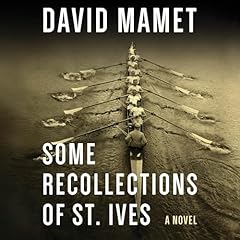
The Secret Knowledge
On the Dismantling of American Culture
No se pudo agregar al carrito
Add to Cart failed.
Error al Agregar a Lista de Deseos.
Error al eliminar de la lista de deseos.
Error al añadir a tu biblioteca
Error al seguir el podcast
Error al dejar de seguir el podcast
 Exclusivo para miembros Prime: ¿Nuevo en Audible? Obtén 2 audiolibros gratis con tu prueba.
Exclusivo para miembros Prime: ¿Nuevo en Audible? Obtén 2 audiolibros gratis con tu prueba.Compra ahora por $17.33
-
Narrado por:
-
Johnny Heller
-
De:
-
David Mamet
For the past 30 years, David Mamet has been a controversial and defining force in theater and film, championing the most cherished liberal values along the way. In some of the great movies and plays of our time, his characters have explored the ethics of the business world, embodied the struggles of the oppressed, and faced the flaws of the capitalist system. But in recent years Mamet has had a change of heart. He realized that the so-called mainstream media outlets he relied on were irredeemably biased, peddling a hypocritical and deeply flawed worldview. In 2008 he wrote a hugely controversial op-ed for the Village Voice, "Why I Am No Longer a 'Brain-Dead Liberal,'" in which he methodically eviscerated liberal beliefs. Now he goes much deeper, employing his trademark intellectual force and vigor to take on all the key political and cultural issues of our times, from religion to political correctness to global warming. Mamet pulls no punches in his art or in his politics. And as a former liberal who woke up, he will win over an entirely new audience of others who have grown irate over America's current direction.
©2011 David Mamet (P)2011 TantorLos oyentes también disfrutaron:




















Reseñas editoriales
Noted playwright David Mamet brings the zeal of a recent convert to his book, The Secret Knowledge: On the Dismantling of American Culture read by Johnny Heller. Mamet attacks modern liberalism by taking on frequent conservative targets, for example, global warming, feminism, and liberal arts education; he tackles modern politics with the crisp, unbridled venom that is a hallmark of his dramatic work. This work is prose, not dialogue, yet Johnny Heller grabs onto the words and infuses them with biting emotional energy. Mamet's writing is award-winning and that talent is clearly apparent in The Secret Knowledge. Heller makes listening to the book a visceral experience as he sneers and spits some of Mamet's choicest criticisms of the left, frequently causing the listener to flinch at many of the author's statements. Through Heller's highly charged delivery, the author mounts scathing attacks on the loss of critical thinking skills, critical questioning skills, and higher education's complicity in that endeavor.
David Mamet's body of work, from riveting plays like Glengarry Glen Ross and American Buffalo to films such as Wag the Wog, as well as essays too numerous to mention, have given sharply critical, frequently ironic, and unquestionably brilliant comments on American life and whatever is referred to as The American Dream. In The Secret Knowledge, Mamet goes for the jugular of the liberal movement and its thrall in American politics, seeing no need to leave survivors. It is at the very least provocative. No doubt it will encourage many to welcome the respected American playwright and screenwriter to the conservative fold, while bringing forth outbursts reminiscent of Mamet's colorful dialogue from the liberal side. Carole Chouinard
Reseñas de la Crítica
Las personas que vieron esto también vieron:









Mamet's use of Latin also defines him as a sychophant of the evil patriarchy.
It's Mamet ergo BRILLIANT!!!
Se ha producido un error. Vuelve a intentarlo dentro de unos minutos.
Extremely Refreshing
Se ha producido un error. Vuelve a intentarlo dentro de unos minutos.
what was left
Se ha producido un error. Vuelve a intentarlo dentro de unos minutos.
A Consevative Milestone
Se ha producido un error. Vuelve a intentarlo dentro de unos minutos.
Filled with rational clear argument explaining the folly--and destructive nature--of liberalism.
A great story told by a great storyteller
Se ha producido un error. Vuelve a intentarlo dentro de unos minutos.


